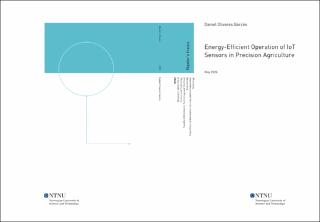| dc.description.abstract | IoT devices aim to have significant relevance the next big revolution in the field of agriculture. Sensor-based irrigation, disease prediction or custom super-localized weather forecasts are just some examples of what IoT can provide to agriculture. For this thesis we put the focus on soil moisture sensors in the context of sensor-based irrigation. These sensors provide the farmers with real-time data of soil moisture from their crops. This data can be used to make decisions like start or postpone an irrigation event finding the optimal moment. This decision support helps the farmer not only to optimize water management but also to save labor avoiding unnecessary trips to the crop since irrigation can be automated or taken remotely.
IoT technology has evolved a lot during the last years increasing battery-life of the devices. However, IoT sensors are still energy constrained. Some devices include solar panels to be self-sufficient but they present some drawbacks. Long periods of darkness can exhaust the battery and interrupt the flow of data. To solve that manufacturers increase the size of the batteries or the solar panels. This solution increase also the price and size of the devices making them less interesting for the user. For this work we acquired a product largely used by farmers to measure soil moisture remotely. Checking the its operation and exploring other options in the market we discovered that there is big room for improvement in the energy management of these devices.
The goal of this thesis is to discuss how the energy-operation of IoT soil moisture sensors could be improved. For that we propose to replace static sensing strategies based in a fixed sampling frequency by energy-smart sensing policies able to adapt the sampling frequency to the relevance of the data. We will study the state of the art of sensor-based irrigation interviewing also stakeholders to define the user requirements. We will use these requirements to understand what makes some moisture measurements more valuable than others. Once we understand which moisture measurements are valuable and which not we will explore different smart sensing strategies able to skip not valuable readings. In other words, sensors exchange energy for nformation, our objective is to optimize that trade-off by avoiding irrelevant data collection. Finally we proved that energy-smart sampling policies based in the relevance of the measurements are a valid solution to reduce the use of energy while keeping similar quality of information. | |
